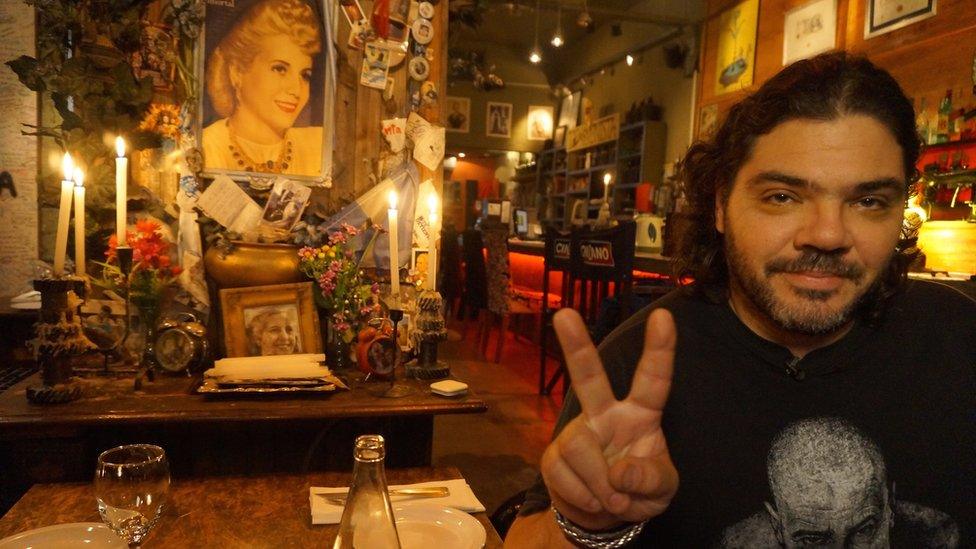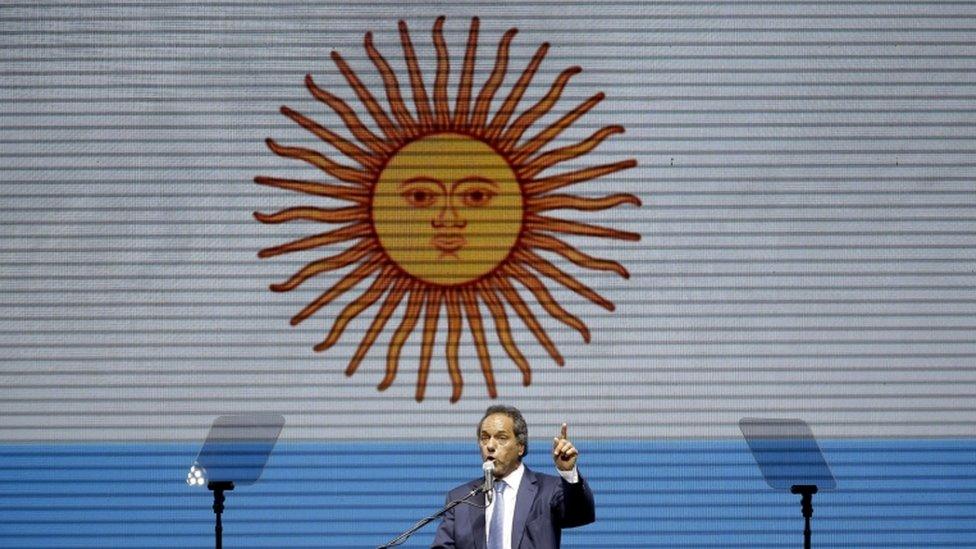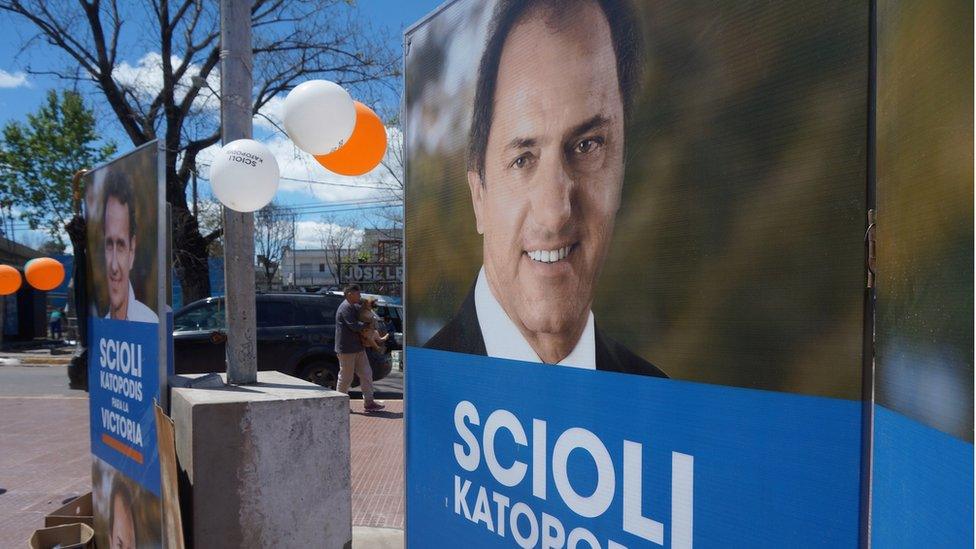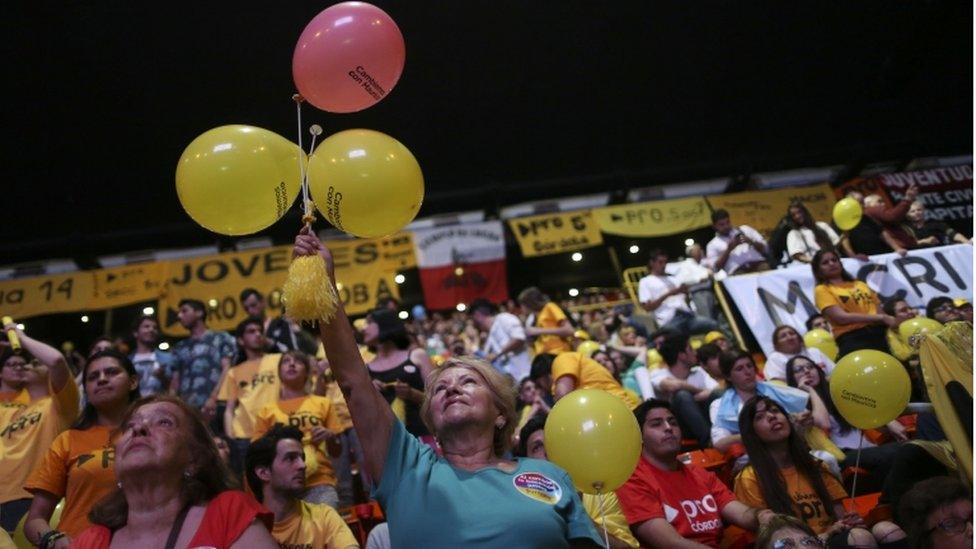Argentina elections: There may be trouble ahead
- Published

Bar owner Daniel Narezo is a keen Peronist supporter
Cristina Fernandez de Kirchner certainly divides opinion in Argentina.
"I think that Cristina has been one of the top five leaders in the world", says Daniel Narezo, a Peronist activist and owner of the Buenos Aires bar Peron, Peron.
The bar is dedicated to the founders of the uniquely Argentine populist ideology that bears their name. The walls are not only plastered with images and speeches from Juan Domingo and Eva Peron, but also of Cristina, as she's known to Argentines - a worthy successor to Evita say her supporters.
"It will be almost impossible to replace her, just like Hugo Chavez in Venezuela," adds Narezo, clearly a fan of the outgoing president. "Perhaps her greatest achievement has been reengaging people with politics - young people in particular. With all her social achievements, that will be her legacy."
Others are less convinced about the state of the country Cristina is now leaving behind after eight years as president.
"Her government decided to spend the few dollars that were left at the Central Bank. So now the next president is going to find the Bank empty," says Martin Redrado, somewhat wryly.
Redrado should know because he quit his post as governor of the Central Bank of Argentina over what many regarded as the government's irresponsible and unsustainable spending.
"To give you an idea", Redrado tells me, "When I left the Central Bank there were $50 billion, real dollars, liquid dollars ….. now we are left with net reserves of just 10% of that. Basically, in the last year, they decided to use it all, so the bill is left for the next president."

Peronist candidate Daniel Scioli may face stormier weather than he hopes
Two differing views on perhaps why, despite Argentina's perilous economy and stubbornly high levels of poverty, Cristina Fernandez de Kirchner's approval ratings are well over 50%.
Less than a year ago, CFK was staring into the political abyss.
The country had technically defaulted over a long-running dispute with a minority of overseas-based creditors. The central government had fallen out with the country's powerful agricultural sector over the high tax regime. Some of the ruling party's own supporters even took to the streets, protesting for better conditions.
Then, at the start of the year, in a high profile case that shook the country, a public prosecutor was found shot dead in his own apartment.
Alberto Nisman had been due to testify in Congress against the government. He'd even issued a draft arrest warrant for President Fernandez de Kirchner for allegedly helping to cover up the 1994 bombing of a Jewish cultural centre in Buenos Aires.
Whether suicide or murder, many blamed the government for Nisman's death and Cristina's stock could hardly have been lower.

Daniel Scioli looks set to win, thanks to Cristina Fernandez de Kirchner's backing
But somehow she bounced back. Spending on popular welfare programmes went up, she struck trade and financial deals with China which gave Argentina access to vital credit and the Peronist movement's army of young activists was mobilised to work on her behalf.
As for Nisman, Argentina's notoriously complicated and drawn out legal system is still dealing with the case and no one expects a breakthrough soon. Most importantly for Cristina, little of the mud that was thrown in her direction has stuck.
Little wonder, perhaps, that at a political rally towards the end of this presidential campaign, Cristina let her hair down and started dancing on the stage - to the delight of her supporters but perhaps the embarrassment of the man standing next to her. He was Daniel Scioli, Cristina's handpicked successor as the "Front for Victory" (official Peronist) candidate.

Mauricio Macri's supporters look likely to be disappointed, come polling day
Scioli will probably win either in this weekend's first round or in a November run-off, thanks to the Peronist Party machine. But the outgoing governor of Buenos Aires province lacks Cristina's charisma and her rapport with Argentina's working classes.
Perhaps the reason for Scioli's reluctance to dance with Cristina on stage was that he knew what was around the corner: rocketing inflation, embarrassing levels of poverty and inequality and those empty Central Bank coffers.
While the opposition candidates, dissident Peronist Sergio Massa and the centre-right Mauricio Macri, might try to tackle the looming crisis, Scioli says he's not set on wholesale changes.
Cristina's supporters say she's leaving Argentina in better shape that ever. Yes, this is still a wonderfully diverse, classy and artistically rich country but it's difficult to see how that claim can be justified.
Argentina has been in gradual decline for decades and despite her charisma, Cristina has presided over an increasingly divided nation.
Daniel Scioli might win these elections, thanks to the outgoing leader's endorsement and support, but he must know there's trouble ahead.